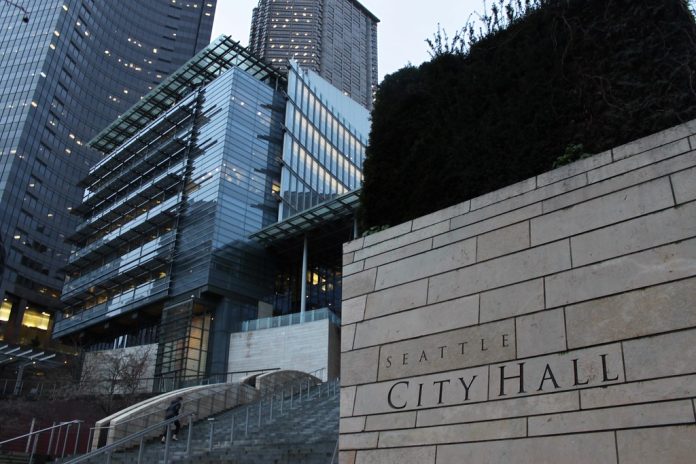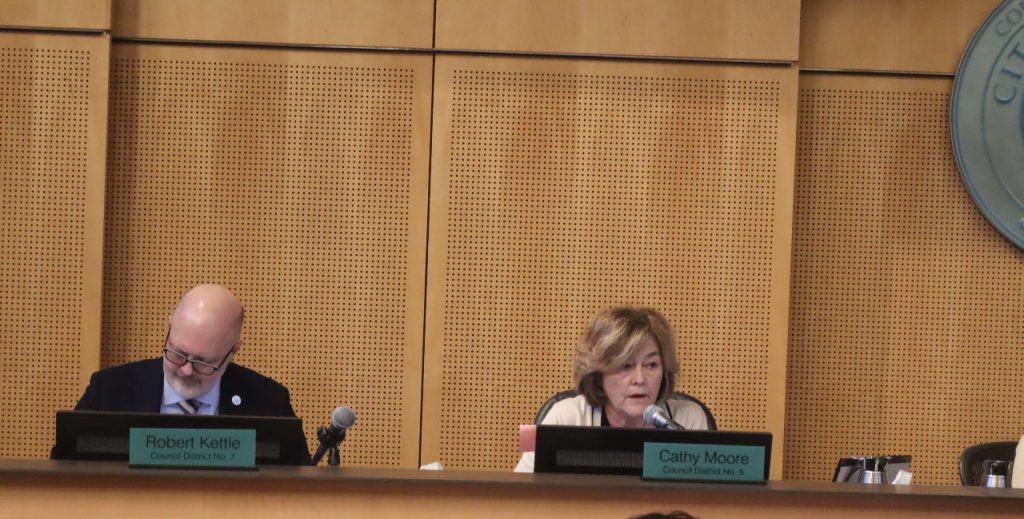
This week, the Seattle City Council is poised to consider gutting the Ethics Code, removing a requirement that councilmembers recuse themselves from voting on matters that affect or appear to affect their personal interests. Instead, councilmembers would merely have to disclose conflicts of interest; they could then vote freely.
The Seattle Times reports that Councilmember Cathy Moore, who proposed the change, claims that the timing is unrelated to any particular legislation; but that’s hard to swallow. After all, she’s been working for months on legislation that would weaken Seattle’s renter protections, and at least a couple of her colleagues happen to be landlords. The current rules could make that legislation harder to pass.
One of the renter protections under threat is the $10 monthly cap on late fees that I fought hard for in 2023 alongside fellow members of the Stay Housed Stay Healthy coalition. Nevertheless, when I first heard about the proposed rule change — back when it was rumored in The Stranger last fall — I have to admit I found some of the arguments for it compelling. One could easily imagine a scenario where even a majority of the council are landlords. Should they really be barred from legislating on an entire, significant area of city policy? Doesn’t that disenfranchise the people who voted them into office? If we don’t want landlords making decisions for us, maybe we should just stop electing landlords.
After more digging and reflection, however, I’m convinced that watering down our Ethics Code is a terrible idea. Here’s what changed my mind.
Radically loosening our Ethics Code will deepen already-pervasive political cynicism. We live at a time when trust in government is near rock bottom. We’re seeing unprecedented self-dealing at the federal level, from Trump’s and Musk’s shameless antics to congressional stock trading during tariff-induced fluctuations earlier this year. Cities like Seattle should be doing everything we can to rebuild trust in our local government. Permitting elected officials to enrich themselves through the votes they take on the dais would be toxic to any lingering faith in our democracy.

If we make this change, Seattle will become an outlier. We’ve had this basic rule in place since 1980, and many other large cities with full-time councils require similar recusals: Portland, San Francisco, San Jose, Los Angeles, and San Diego, to name a few on the West Coast.
And it’s not just elected officials. Private companies generally have similar rules about conflicts of interest, preventing board members and employees from using the power of their positions to benefit themselves or family members. City staff are bound by such rules, too. Implementing the proposed change would result in lower standards for elected officials than for City employees.
Wayne Barnett, head of the Seattle Ethics and Elections Commission, told The Seattle Times that he supports the proposed changes because the current rules have put the commission uncomfortably “in the middle of political matters of City Hall.” If the commission feels the current rules are too vague about what constitutes a disqualifying conflict of interest, leaving too much to its case-by-case discretion, then those rules should be reviewed and clarified — not tossed out the window altogether. In the present context, this is basically saying “ethical judgements are hard, so let’s have no ethics at all.”
The scope of the proposed change really is mind-boggling. If Chris Hansen had been on the council earlier this year, he could have voted to rezone SoDo for residential housing, to his own massive personal financial benefit. If Jeff Bezos had been a councilmember in 2020, he could have voted against the JumpStart tax. If Rob Saka owned a curb removal business, he could have… You get the idea. Disclosing that you have a conflict of interest doesn’t make the conflict of interest any less real.
The notion, also expressed by Barnett, that normal electoral processes provide sufficient protection doesn’t hold water. It’s not as though candidates will warn voters on the campaign trail that they intend to use their office for personal gain. And it’s unrealistic to expect voters to research candidates’ assets and interests and anticipate all the creative ways they could engage in self-dealing if elected. A four-year term is a long wait to hold someone to account.
Yes, we do have a recall process. But as someone who’s run successful citizen’s initiatives, I can tell you that immense labor and resources go into that kind of effort. It’s not a tool that’s accessible to ordinary people without institutional backing or funding.
So, what about the problem I raised at the outset, of disenfranchising voters by denying their chosen representative a vote? I think most Seattle voters care about the integrity of our democratic process and understand why conflict of interest rules are important. As a wise man once noted, it’s difficult to get a man to understand something when his salary depends on his not understanding it. Personal financial interest has a way of worming its way into people’s beliefs and opinions, whether they like it or not and whether they know it or not.
Seattle’s conflict of interest rules kick in precisely when the personal interests of an elected official diverge markedly from the interests of “a substantial segment” of the people who elected him. It’s those personal interests that truly threaten to disenfranchise the voters; recusal, or forced abstention, is better than letting personal gain or loss tip the scale. In this as in so many things, politics involves tradeoffs, and this is a sensible one.
Disclosure alone simply isn’t good enough, as former councilmember, now deputy mayor Tim Burgess argued when this same weakening of ethical standards was debated back in 2016:
“The disclosure standard does not meet the stated intent of the council in SMC 4.16.020 that ‘public office not be used for personal gain.’ Nor does disclosure ‘cure’ the perception that an elected official has a conflict of interest,” Burgess said at the time. “Quite the contrary, the proposed change allows a councilmember with an actual conflict of interest to disclose that fact and then vote, a deeply troubling lowering of our ethical standards.”
Will our city council and mayor heed this common sense, or will they open the door to the kind of naked self-dealing that’s happening every day in Trump’s Washington? C’mon guys, this one shouldn’t be hard.
Katie Wilson is General Secretary of the Transit Riders Union, a Seattle-based organization advocating for improving transit quality and making access more equitable. In 2025, she launched a run for Seattle Mayor.

